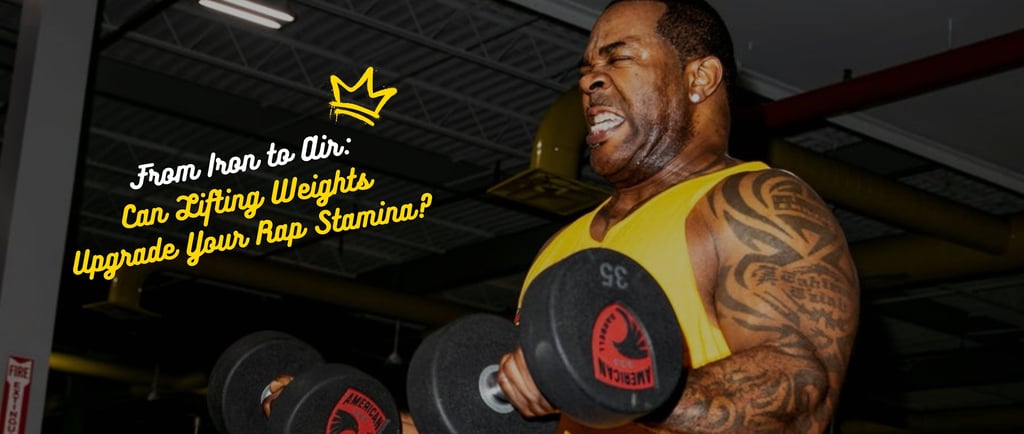From Iron to Air: Can Lifting Weights Upgrade Your Rap Stamina?
Weight training isn’t just for gains—it’s a secret weapon for better breath control. Can Weight Training Improve Breath Control? explores how compound lifts, core strength, and posture work together to boost vocal endurance and airflow control. Whether you’re on stage or in the booth, this guide shows how building strength can level up your breath game and performance power.
CARDIOVASCULARBREATH CONTROLWEIGHT TRAININGSTRENGTH TRAINING
dj miss kittie
5/15/20252 min read


Can Weight Training Improve Breath Control? (Types of Training That Help)
Weight training isn’t just about building muscle—it can also play a crucial role in improving your breath control. Whether you're rapping, singing, or performing, developing strength through weight training can enhance your ability to control your breath and improve vocal endurance. Let's explore how different types of weight training can support breath control.
1. The Connection Between Weight Training and Breath Control
How Strength Training Helps:
Weight training involves controlled breathing during each lift, which can help improve your ability to maintain steady, controlled breathing in high-pressure situations, such as performing or recording.
The more efficient your muscles are, the less oxygen they require, which leaves more oxygen available for your lungs during performances.
2. Types of Weight Training That Help Breath Control
1. Compound Movements:
Exercises like squats, deadlifts, and bench presses engage large muscle groups and require deep, controlled breathing to stabilize the body.
These exercises promote diaphragmatic breathing, strengthening the diaphragm and improving your ability to control airflow when performing.
Pro Tip: Focus on deep belly breathing during compound lifts to activate the diaphragm and improve lung capacity.
3. Core Training for Better Breath Control
Strengthening Your Core:
The core muscles (abdominals, obliques, and lower back) are integral to stabilizing your body while performing. A strong core supports better breath control by giving you the ability to engage your diaphragm and maintain steady airflow.
Planks, Russian twists, and leg raises are excellent core exercises that help develop breath support.
Tip: When performing core exercises, focus on breathing deeply through the diaphragm instead of shallow chest breaths.
4. Weight Training and Posture for Improved Breathing
Posture Matters:
Good posture is essential for efficient breathing. Weight training, particularly exercises that target the back and shoulders (e.g., rows, overhead presses), help improve posture by strengthening the upper body.
Improved posture opens up the chest and ribcage, allowing for better lung expansion and easier airflow during performance.
Tip: Incorporate posture-focused exercises (like reverse flys and chest stretches) into your routine to promote better lung function.
5. High-Intensity Weight Training for Increased Lung Capacity
HIIT and Weight Training for Breath Control:
High-intensity interval training (HIIT) with weight training is an excellent way to challenge your respiratory system. Short bursts of heavy lifting followed by brief rest periods simulate the high-effort demands of a live performance.
This form of training improves both strength and endurance, helping your lungs adapt to periods of exertion while maintaining control over your breath.
Tip: Combine weightlifting with short, intense cardio intervals (e.g., kettlebell swings or medicine ball slams) to mimic the breath demands of live performances.
6. Best Practices for Using Weight Training to Improve Breath Control
1. Incorporate Deep Breathing:
Focus on deep, diaphragmatic breathing during weightlifting to activate and strengthen your diaphragm.
2. Prioritize Core and Compound Lifts:
Incorporate exercises like squats, deadlifts, and planks to build a strong core and improve your breath support.
3. Practice Controlled Breathing During Sets:
Maintain control of your breath during each rep, ensuring that you’re not holding your breath or rushing your exhale.
The Bottom Line: Weight Training Can Enhance Breath Control
Incorporating weight training into your fitness routine offers more than just strength benefits—it’s a powerful tool to improve breath control. By focusing on compound movements, core training, and posture, you’ll build a solid foundation for both physical and vocal endurance. Whether you’re rapping, singing, or performing, the strength you build will give you the breath support you need for sustained power and control.
